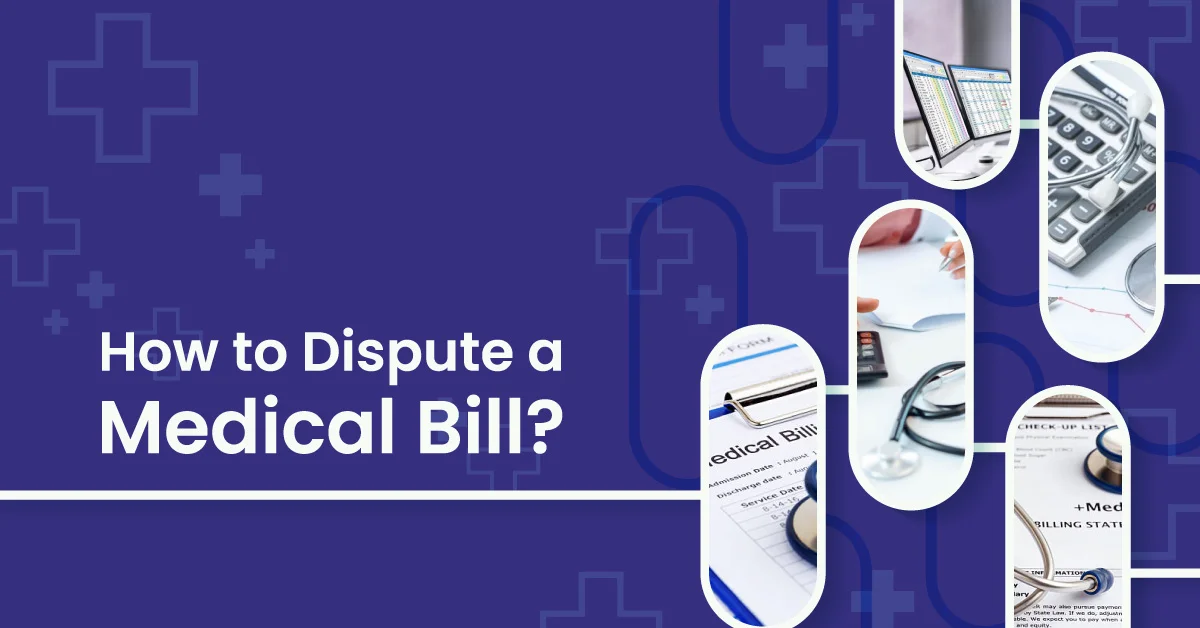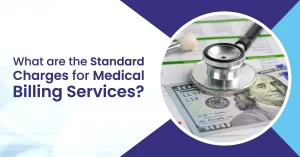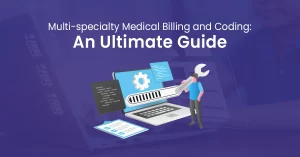When you visit a physician or other health care provider, you may be required to pay out-of-pocket expenses such as copayments, coinsurance, and a deductible. If you see this practice and facility, not in your health plan’s setup, you may incur additional costs or be required to pay the entire bill.
It is possible that your health plan doesn’t have a contract with out-of-network providers and facilities. Providers who are out of network may be able to bill you for the difference between what your plan agreed to pay and the overall cost of a service. This cost is referred to as “balance billing.” This amount is likely to be higher than the in-network cost for a similar service and may not count toward your annual out-of-pocket limit. You may be tangled and stunned if you have received an excessive medical bill. Disputed medical bills raise the question, “how to dispute a medical bill?” You don’t have to struggle with your dispute independently—medical bill dispute advocates are available to help. They can scrutinize, inspect and negotiate your bill to save you thousands of dollars.
Surprised Medical Bills
Unpredicted or surprise medical bills are becoming more common, and unfair billing practices are rising. Medical bills are prone to errors in 80% of cases. This is why, before you pay, it is critical to understand whether your bill is properly and justly formed or not.
If you are uninsured, health care providers and facilities must deliver you with a worthy reliance estimate before providing you with care, it is commenced at the start of 2022.
Receive your bill and realize that you were charged $400 or more than expected and predicted in worthy reliance. You can use a new practice to request that an independent third party, known as a dispute resolution entity, review your case and determine appropriate payment. Resolution of medical bill dispute between patient and healthcare provider considers being “patient-provider dispute resolution.”
The dispute resolution unit will analyze your worthy reliance estimation, your bill, and any data provided by your provider or facility to determine whether you should pay the amount on your worthy assurance estimation, the billed charge, or a sum. This article will give you subject pointers that will assist you in how to dispute a medical bill.
According to CMS, there is a $25 non-refundable administrative charge to initiate this practice.
Alternative Eligibility for Dispute Resolution
You’ll be capable of using this technique if:
- You are uninsured or self-pay: you have insurance but did not use it to pay for a medical entry or services.
- Your provider has provided you with a reasonable estimate.
- You have a bill from the last 120 days or about 4 months.
- The difference between the worthy reliance estimation and the providers or facility’s bill is at least $400.
Remember that the worthy reliance estimate of the bill may include costs from more than one provider. In order to be eligible for patient-provider dispute resolution, you must have a bill from an individual provider or facility that is at least $400 higher than the total expected costs on the reasonable faith estimate from that provider or facility.
How to Initiate the Billing Dispute Process?
You are authorized for the dispute resolution practice if you meet all the above circumstances. To twitch the practice, you’ll need a copy of your worthy reliance estimate and a copy of your bill. Upon requesting copies of these papers and paying an administrative fee, dispute resolution practice will be started.
According to CMS, a $25 non-refundable administrative fee is required to initiate the patient-provider dispute resolution process. If the dispute resolution entity rules are in your favour, the amount you owe your provider will be condensed and reduced. You can pay this fee online or mail a money order when you submit your dispute form. Personal payments will not be acknowledged and accepted. If you mail your dispute form but pay online, once medical billing companies receive your dispute form, they will send you an email with instructions on how to complete your payment online. Some of the points mentioned below convey how to dispute a medical bill.
- Start an online argument.
- Initiate a dispute by mail or fax.
- Your rights and safeguards during the patient-provider dispute resolution process are reserved.
- Your provider or facility cannot threaten you with legal action while the dispute resolution process is ongoing.
- They cannot move or threaten to move your bill for the disputed item or service into collections. If the bill is previously collected, the provider or facility must halt this action.
- Your provider or facility cannot charge late fees for unpaid bills until the dispute process is completed.
- Reaching an agreement before the dispute process is over.
- You and your provider or facility can settle the payment through financial assistance, offering to let you pay an amount less than the billed amount or support to pay the bill charges in full at any time after the dispute resolution process begins but before a resolution is made.
If you and your healthcare provider agree on a payment amount, they must deduct at least half of your bill’s $25 administrative fee. Your provider must also notify the dispute resolution entity of the settlement.
Medical expenses are an inevitable part of life. You or someone in your family will need to see a physician at some point and be sent home with a bill. On occasion, errors and additional charges may appear on your bill. Here’s what you should do if you believe there are errors on your medical bill.
Get a Detailed Bill Copy
Sometimes your physician or healthcare practice will send you a bill with a lump sum due. The first step in disputing your bill is to request a complete copy of the bill.
When you get a detailed bill, every charge is clearly listed, so you know what you’re paying for. Examine your bill thoroughly, look for double charges, coding errors, and so on.
Compare the charges you’re accountable for against what your insurance company is responsible for in the items against your health insurance plan. Then, look over your bill for any charges your provider should cover.
It’s also an excellent indication to wait for your insurance’s Explanation of Benefits (EOB)report, which explains what they’ve covered for that specific date and health care visit. Check that the healthcare practice or physician bill shows your benefits of payment that are applicable.
If you have Medicaid, charges should be billed to Medicaid rather than to you. Medical providers cannot charge more than Medicaid allows. If your doctor does not accept Medicaid, they must notify you in advance and you must agree in writing.
Consult Your Medical Provider
If you believe there is an error in your medical bill, contact your Medical billing firm and explain the reason for your disputing medical bill. Request that they review the excessive charges and correct any errors that exist in medical billing.
Sometimes your physicians will tell you that your insurance company should cover these costs. Request a letter from your physicians explaining why they disagree with your insurer’s claim rejection decision. Enlist the tags of anybody you speak with about your bills, the dates you spoke with them, and an instantaneous of what you conferred or any decisions you have made.
If any issues arise, make sure to discourse them as soon as possible. Most providers give you 60 to 90 days to pay your bill. If it is not paid within that time frame, it will be turned over to a collections agency, which can harm your credit. While speaking with your insurance provider, request that the provider not send the bill to a collection agency.
Contact Your Insurance Company
Examine your plan thoroughly and speak with your insurance provider. If you believe they should cover the bill or reimburse you, file an appeal. That is usually done quickly, within 30 to 60 days. Include your medical records and letters from your physicians explaining why they disagree with the insurer’s decision to deny coverage.
Expect delays and keep detailed records of who you speak with when you speak with them and a summary of the discussions. That may be useful if you need to file a complaint with the administration.
Dispute a Medical Bill with a Collection Agency
If the bill is sent to the collection organization while you are inside an appeal, report the collection agency. Send a letter affirming that you are disputing the bill within 30 days. Request that they not take the case to court while it is being investigated. Also, discuss the problem with your physician or medical billing company. If it’s an insurance issue, explain your coverage and provide contact information for the provider. Make sure to send all letters certified mail with a return mail request. Save all the records of disputing medical bill information.
Consult a Medical Advocate
If your appeal is denied, consider contacting a free medical advocacy organization. They can negotiate with your insurance company or your physician on your behalf to find a solution. For information on medical advocates who can assist you, contact your local community resources
Negotiate a Medical Bill with Your Physician
If these steps fail to resolve the issue and you are still required to pay, you can negotiate with the medical provider. Request a concession and offer to send proof of income, significant expenses, or disability that prevents you from working, as well as other documents such as tax returns or bank statements. Some providers can provide immediate concessions up to some extent.
If you are unable to pay the bill, communicate with your physician or healthcare practices about financial assistance programs. You may be eligible for a portion of the bill to be covered.
Examine Your Insurance to Avoid Future Issues
Medical bills can be a significant financial burden on families. Before receiving medical services, review your insurance plan and understand your necessities and coverage to avoid problems. Complex billing codes and processes can make understanding what you are being charged for challenging. In many cases, a patient should not be billed for a specific procedure code that appears on a bill. Having a qualified advocate work on your case can protect you from unfair or unethical medical billing practices.
A Medical Bill Dispute Prosecutor Specializes In Coding and Billing
A medical bill dispute can be stressful and time-consuming. It can also be very frustrating because most people do not understand medical coding and billing practices. This is why it is critical to have someone on your side who is experienced in dealing with and resolving medical bill disputes.
Somebody with a professional background in coding or billing can be a medical bill dispute advocate. This means they understand precisely how a medical encounter translates into a medical bill. An advocate can scrutinize a bill and break down each item, line by line because they have inside knowledge of medical billing practices. The advocate will be able to determine the following by conducting an analysis:
- Was the medical bill appropriately coded?
- Were the services correctly billed?
- Was the medical bill compensated according to the insurance policy?
- Did the provider bill correctly?
After conducting a thorough audit, the advocate will know how to dispute a medical bill.
An Advocate Declares the Insurance Company’s Linguistic
Communicating with the insurance company is ineffective for most people who try to dispute medical bills on their own. Patients who are unfamiliar with medical billing or the insurance industry may not understand the terminology or questions to ask. As a result, the insurance company may provide inaccurate information.
An advocate understands how to contest medical bills and obtain immediate results. They can easily cut through red tape and effectively argue on their client’s behalf. Because medical bill dispute advocates are familiar with insurance industry jargon, they can quickly negotiate significant reductions and facilitate appeals. For disputing medical bills, it’s necessary to know how to avoid surprise medical bills, which can create an excessive mess.
How to Avoid Surprise Medical Bills?
Any unexpected expenses incurred by a patient following medical treatment are surprise medical bills. This includes an out-of-network charge, unexpected facility fees, a balance bill, or any significantly higher bill than you anticipated. Even if you have premium insurance, the unexpected medical costs at the end of the procedure do not fully compensate you for all medical care. Surprising medical bills are all too familiar these days. Patients receive the services they require while also receiving a medical bill that exceeds their expected cost by tens of thousands of dollars. Further down are some supportive instructions to protect yourself from unexpected medical bills to help you avoid these payments.
Guidelines for Avoiding Surprise Medical Bills
Captivating the following precautions before receiving medical treatment is the simplest way to avoid unexpected medical bills. As a result, these measures appear to be better apt for scheduled operations.
Regulate What Your Insurance Policy Covers
Take your time reading through the benefits of your package and making notes. You should be fully aware of all the benefits of the package. A better understanding of your contract will help you avoid unexpected medical expenses, and you should always contact your insurer to confirm coverage of the necessary medical procedure.
Confirm that Providers Are In-Network
The provider network changes all the time, so it’s a good idea to check with your insurer before the procedure to ensure the physicians you’ll be seeing are still on the network. Keep this information accessible because it will come in handy if you get a surprise bill.
Predictable Charges
Many insurers provide a medical bill charges estimator to help you estimate the cost of each specific treatment. Along with this, numerous third-party applications on the internet will assist you in obtaining cost estimates for any treatment. Contact the health care provider after receiving the estimated rate and request an estimate in advance. Compare the fees to your own researched values and see if there is a significant difference. Your healthcare provider’s estimated charge will also support you avoid a surprise bill.
Acquire State Support
While no federal regulations protect patients from surprise billing, some states have policies protecting patients from specific medical bills. In some states, patients are protected from charges for emergency room visits involving network physicians. As a result, it’s a worthy clue to check with the state department to see if any legal necessities will aid you evade surprise bills.
Analyzing the Medical Bills
Healthcare practices manage a large amount of data daily, so billing errors are too common. They may have used incorrect insurance records, billed you for services you never received or used incorrect dates. Always double-check your medical bills to see if there is an inconsistency.
Submit a Petition
Medical bills also include instructions on how to file an appeal if you suspect an error. If you notice that you are being overcharged, it is a good idea to file a formal complaint with your insurance provider. When you intend to dispute a medical bill with your insurance, inform your healthcare provider and request that the bill have not sent to collection. Although they are not required to do so, this request will allow you to accept more time to resolve your dispute with your insurer.
Ask About the Payment Proposal
If all other procedures flop and it is vibrant that the bill is valid and you must pay the payments, it is best to seek financial assistance or a payment plan. Many billing departments offer payment plans with low to no interest rates to assist you in paying your medical bills rapidly.
Comprehend the Alternative ways
Medical trials can be stressful for patients and their kin; the unexpected medical bills can compound the anxiety. Although there is no deadline for the government to implement regulations that would eliminate surprise bills, they can be avoided by executing the uncomplicated authorizations stated above.
Bellmedex can Assist You with Your Medical Bill Dispute
A medical bill dispute can be a challenging practice. Your medical bill could be substantial depending on the treatment you received. Bellmedex has been in the medical billing business for many years and knows what it takes to speedily and effectively dispute even the most complicated medical bills. Outsource medical billing because our medical bill dispute advocates are skilled at navigating the insurance mess and will not agree to take “no” for a response. They provide a fee-based service for those looking to dispute their medical bills. Contact us for a consultation to learn how to dispute a medical bill and get started on resolving your medical bill dispute.




